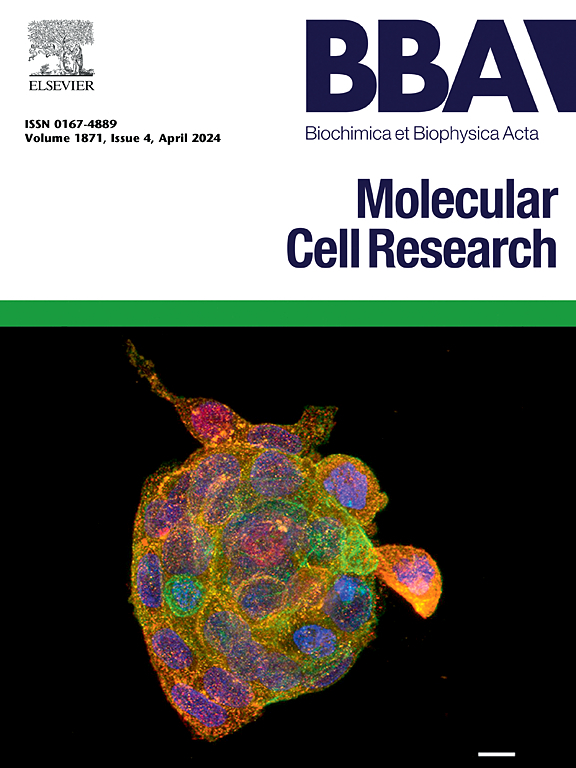致癌 KRAS 突变可调节 BAX 介导的细胞死亡。
IF 4.6
2区 生物学
Q1 BIOCHEMISTRY & MOLECULAR BIOLOGY
Biochimica et biophysica acta. Molecular cell research
Pub Date : 2024-11-06
DOI:10.1016/j.bbamcr.2024.119872
引用次数: 0
摘要
克尔斯滕大鼠肉瘤病毒癌基因同源物(KRAS)属于 GTPase RAS 超家族,它调节多种细胞信号通路,参与控制重要的细胞功能,包括细胞凋亡。KRAS 中的致癌突变被认为是最常见的功能增益突变,影响着 30-50% 的结直肠癌(CRC)患者。虽然 RAS 蛋白通常起抗凋亡作用,但人们对 KRAS 突变参与凋亡调控的情况知之甚少。在此,我们旨在阐明突变的人类 KRAS 在调控 BAX(Bcl-2 家族中一个关键的促凋亡成员)中的作用。为此,我们利用了较简单的酵母模型酿酒酵母(Saccharomyces cerevisiae),使用缺乏主要酵母 RAS 异构体(ras2Δ)的细胞与人类 BAX 共同表达野生型 KRAS(KRASWT)或在 CRC 中最常见的 KRAS 突变(KRASG12D、KRASG12V 或 KRASG13D)。我们发现,与 KRASWT 相比,KRAS 突变体对 BAX 诱导的死亡和细胞色素 c(cyt c)释放具有抵抗力。KRAS 异构体对 BAX 的调节似乎来自于这些蛋白之间的直接相互作用,因为它们共同定位在线粒体上,而且有证据表明它们可能存在物理相互作用。我们进一步发现,乙酸能显著增加表达 BAX 和共同表达致癌 KRAS 突变体的细胞的细胞死亡,但不能增加 KRASWT 的细胞死亡。这提示了一种潜在的机制,可以解释携带 KRAS 激活通路的 CRC 细胞对醋酸的敏感性增加的原因。这些发现有助于人们更清楚地了解 KRAS 如何调控 BAX 的功能,这是肿瘤进展的一个相关方面。本文章由计算机程序翻译,如有差异,请以英文原文为准。
Oncogenic KRAS mutations modulate BAX-mediated cell death
Kirsten rat sarcoma viral oncogene homolog (KRAS) belongs to the GTPase RAS superfamily, which regulates several cell-signaling pathways involved in the control of important cellular functions, including apoptosis. Oncogenic mutations in KRAS are considered the most common gain-of-function mutations, affecting 30–50 % of colorectal cancer (CRC) patients. While RAS proteins usually play an anti-apoptotic role, little is known about the involvement of KRAS mutations in apoptosis regulation. Here, we aimed to elucidate the role of mutated human KRAS in the regulation of BAX, a key pro-apoptotic member of the Bcl-2 family. For this purpose, we took advantage of the simpler yeast model Saccharomyces cerevisiae, using cells deficient in the main yeast RAS isoform (ras2Δ) co-expressing wild-type KRAS (KRASWT) or the most frequent KRAS mutations found in CRC - KRASG12D, KRASG12V or KRASG13D, along with human BAX. We show that, in comparison with KRASWT, KRAS mutants confer resistance to BAX-induced death and cytochrome c (cyt c) release. The modulation of BAX by KRAS isoforms seems to result from a direct interaction between these proteins, as they co-localize at the mitochondria and there is evidence they may physically interact. We further show that acetic acid significantly increased cell death in cells expressing BAX and co-expressing oncogenic KRAS mutants, but not KRASWT. This suggests a potential mechanism explaining the increased sensitivity of CRC cells harboring a KRAS-activated pathway to acetate. These findings contribute to a clearer understanding of how KRAS regulate BAX function, a relevant aspect in tumor progression.
求助全文
通过发布文献求助,成功后即可免费获取论文全文。
去求助
来源期刊
CiteScore
10.00
自引率
2.00%
发文量
151
审稿时长
44 days
期刊介绍:
BBA Molecular Cell Research focuses on understanding the mechanisms of cellular processes at the molecular level. These include aspects of cellular signaling, signal transduction, cell cycle, apoptosis, intracellular trafficking, secretory and endocytic pathways, biogenesis of cell organelles, cytoskeletal structures, cellular interactions, cell/tissue differentiation and cellular enzymology. Also included are studies at the interface between Cell Biology and Biophysics which apply for example novel imaging methods for characterizing cellular processes.

 求助内容:
求助内容: 应助结果提醒方式:
应助结果提醒方式:


